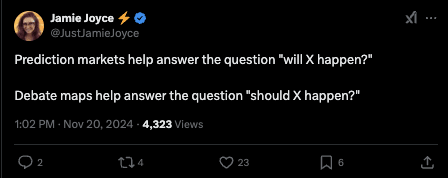Hello folks, first post on LessWrong, so I apologize if I am not familiar with the decorum of this community. However, I have observed there seems to be a bit of disagreement or uncertainty about the comparative utility of prediction markets and (or vs.) debate/argument maps.
From my view, as the founder of a nonprofit organization which uses "debate/argument maps" (deceptively tree-like in appearance, though a graph in nature) to model civilization-scale reasoning on complex issues, it is evident to me that prediction markets and debate/argument maps are useful for different types of questions.
In case this hadn't occurred to others, or some would find me mistaken, I am providing and subjecting my point to this community, since it seems likely to be relevant to many here.
The way I see it -
Prediction markets are for the purpose of answering questions like:
- "Will X happen?"
- "When will X happen?"
- ...and so on.
Debate/argument maps are more useful for questions like:
- "Should X happen?"
- "What should we do about X?"
- "What is X?"
- "What are we getting wrong about X?"
- "What will the impact of X be?"
- "What causes X?"
- "What is known to be sound about X?"
- ....and so on
As I have tweeted before, perhaps a memetically optimal way of putting this is:

At my organization, The Society Library, we have had a volunteer/contractor very recently try to decide which strategy was "best." I would argue that while these approaches are similar in that I assume people are gathering arguments, claims, and evidence to justify reasoning (be it a prediction or a policy suggestion - as we do in the construction of our maps), the process is slightly distinct because the intended outcome of the inquiry (the answer) is distinct.
Given my extensive familiarity with the forms of knowledge construction that debate/argument maps can accommodate (and the implied processes which need to exist to construct those maps comprehensively) and my slight familiarity with the process of making predictions on prediction markets, it seems the two approaches' processes can compliment the other. One approach may be more effectively suited to answering a certain set of questions, while the other approach may be more suited to answering a different set of questions.
I perceive prediction markets stand to benefit from debate/argument maps to improve known knowledge of a given space, and debate/argument maps stand to be improved with the knowledge gathered to make sound predictions, as well as incorporate the predictions themselves as arguments.
Also, I'd like to take the opportunity to clarify a misconception about our debate mapping -
For those of you more familiar with prediction markets than debate/argument maps, I often hear people mistake the maps we make at the Society Library as the intended product itself...and many people state they do not want to consume knowledge as a map. Fortunately, they can, but do not have to. This structured data in the map can simply be searched from the database, incorporated into an interactive briefing document ("Papers"), imported into a decision-making model ("Vote By Reason" [note: digital version almost complete]), shown in a nested, bulleted list ("Perspectives" [note: early AI project, currently ungrounded]) useful for RAG, and can be visualized in many ways by many other partners with different audiences and priorities. We have even used our methods to computationally construct legislation (preLLM boom). For us, the rigor of the methods and the quality of the linked data to populate a debate/argument map is what is important.
So, I have often had to clarify that we use our debate map software because it is practical software that allows us to model the complex entity relationships that we believe are necessary in modeling "civilization scale reasoning" comprehensively (e.g. we can model 10+ descriptive logical relationships, can flexibly accommodate diverse ontologies useful for different questions, maintain chain of provenance and entity history, combine variant linguistic registers and phrasing, embed several pieces of multimedia per claim, add descriptions, quotes, tags, and easily "zip up to hide" and "unpack" the premises in arguments so they can be debated more formally. It is a lot of branching complexity, and our debate/argument mapping software can handle it.
When we have done work for partners in the past (be in nonprofit, government, scientific, etc.), we deliver the knowledge in whatever form appeals to them most to the best of our ability, but for us - it is the integrity, comprehensiveness, and quality of the linked data gathered in relation to an inquiry that matters. Debate/argument maps seem to make that more possible than other systems. And our particular software was adapted from an open source project after a thorough inquiry into over 160 other platforms.
With that, I thank you for your time, and because of my enduring and sincere interest in argumentation and debate as a means of truth-seeking, I welcome all corrections to my thinking on the matter, and would be grateful to have updated priors.
I hope this point was useful and not duplicative.
I asked a leading question of our "Perspectives" system, and it gave a few hundred hypothetical reasons (here)